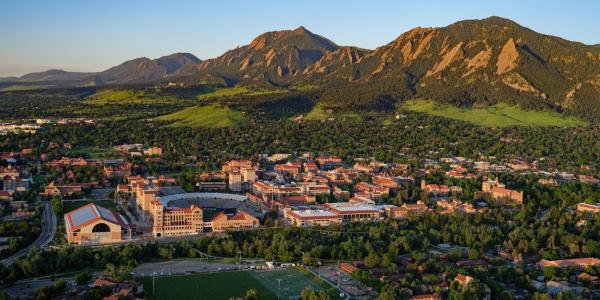 The University of Colorado Boulder and the city of Boulder on Thursday, Feb. 2, announced they have finalized terms of an agreement, subject to City Council approval, for future electric services should a city-owned electric utility begin providing service to customers in Boulder.
The University of Colorado Boulder and the city of Boulder on Thursday, Feb. 2, announced they have finalized terms of an agreement, subject to City Council approval, for future electric services should a city-owned electric utility begin providing service to customers in Boulder.
This agreement does not represent a position in favor of or against the municipalization of electric services by the city itself. The university administration felt it had a fiscal responsibility to ensure CU could continue to manage effectively for the benefit of students and researchers for the long-term. Achieving financial stability, with reliable power that can support the number of people living on campus and the teaching and research facilities/equipment required, was a key objective. CU Boulder is inextricably intertwined with the city and, unlike all other nonprofits and businesses, cannot and would not elect to leave Boulder.
Under terms of the agreement, CU Boulder would agree to purchase electricity from the city utility and continue collaborating with the city and other partners on innovative projects that support clean energy and those that would support the ability of the city and university to recover quickly from highly adverse events—in other words, to enhance our mutual resilience.
The city, in turn, has pledged to uphold or improve reliability standards the university already has in place, to provide CU Boulder with increased financial stability through an agreed-upon rate structure and create an opportunity for CU Boulder to regularly engage the city about system enhancements and reliability.
As part of its exploration into creating a municipal electric utility, last fall the city filed an amended application with the Colorado Public Utilities Commission (PUC) outlining its plan for acquiring Xcel’s local distribution system. The PUC is scheduled to rule on Boulder’s separation plan by June 15.
CU Boulder has actively monitored the city’s municipalization efforts in recent years and is an intervenor in the city’s PUC case. The two began negotiating the new electric services agreement last fall. Under the agreement, which goes before City Council on Feb. 7, CU will take no position on municipalization or the city’s ongoing litigation unless there are changes to the city’s application that would negatively impact CU Boulder. In that case the university reserves the right to raise those concerns after conferring with the city.
The city’s vision in providing electric service is to achieve a variety of clean-energy goals, including creating a path to 100-percent clean electricity by 2030. But the city has also remained open to partnering with Xcel to achieve those goals. If the city does not choose to acquire Xcel’s system and provide its own electric services, CU Boulder will continue to buy power from Xcel.
"CU Boulder’s interest was to ensure that its primary needs of reliability and rate stability would be met," said David Kang, vice chancellor for infrastructure and safety at CU Boulder.
"This agreement allows us to be responsible stewards for the university, while also recognizing our shared goals. As a campus, we see significant value in clean and locally-produced energy, energy efficiency, sustainability and improved resilience. This is a terrific opportunity for us to work together toward this common vision."
Collaboration between CU Boulder and the city on innovative energy initiatives has already begun, with the pair leveraging federal Department of Energy dollars for: campus-wide renewable-energy and resilience analysis, opportunities to leverage smart-energy technologies to enhance reliability and efficiency, building out a microgrid on CU’s East Campus, and initiatives that will improve community resilience with potentially significant cost and environmental benefits.
Examples of other partnerships and projects that CU and the city could undertake together include electrified transit on campus, incubation of new clean-energy technologies and working with the federal labs and private sector on other sustainability and resilience projects.
The new agreement will be in effect for 20 years from the time the city acquires Xcel’s distribution system. If the city does not acquire the system within seven years, the city’s contract with CU Boulder will terminate unless otherwise agreed upon.
The agreement acknowledges that CU is a unique customer and cornerstone institution in Boulder. The university’s campus is home to more than 7,000 students and employs more than 10,000 people.
Given CU’s state institution status as a nonprofit, with the directive of keeping tuition low and education and research levels high, the agreement provides some fiscal stability to the campus. It outlines a rate structure that allows CU Boulder to select the city’s rate or Xcel’s current rate every three years, providing stable cost projections.
In exchange, the city benefits by gaining possible access to CU Boulder’s co-generation facilities to provide an additional power resource, enhance resilience and provide the ability to leverage CU’s innovation and research capabilities.
"CU Boulder is in a class by itself, and we are delighted to reach this agreement," said Heather Bailey, executive director of energy strategy and electric utility development for the city. "It gives us both a higher level of certainty about how we would operate in a customer-provider context. This clarity is helpful as we plan for our future electric utility.
"I’m also looking forward to partnering with CU Boulder to further one of our community’s strongest values—innovation—as we seek ways to support clean energy and enhance resilience. We can accomplish so much as a team."



